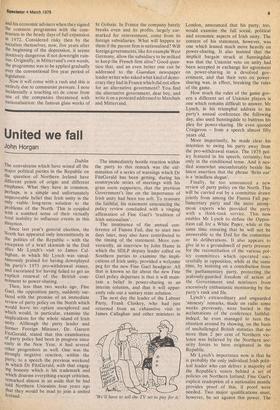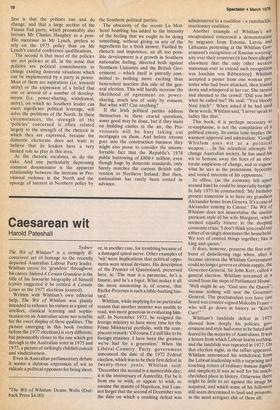United we fall
John Horgan
Dublin
The convulsions which have seized all the major political parties in the Republic on the question of Northern Ireland have different points of origin and different emphases. What they have in common, Perhaps, is a simple and unfortunately
unproveable belief that Irish unity is the only viable long-term solution to the Problems of the North. This is coupled With a numbed sense of their virtually total inability to influence events in this direction.
Since last year's general election, the North has appeared only intermittently in the politics of the Republic — with the exception of a brief skirmish in the Dail after Mr Lynch's visit to James Callaghan, in which Mr Lynch was simultaneously praised for having downplayed his party's 1975 pro-withdrawal stance, and excoriated for having failed to get an explicit renewal of the British commitment to power-sharing.
Then, less than two weeks ago, Fine Gael, the opposition party, suddenly sup, faced with the promise of an immediate review of party policy on the North which would leave no option unexplored and Which would, in particular, examine the Implications for the whole island of Irish unity. Although the party leader and former Foreign Minister, Dr. Garrett FitzGerald, stated that this examination of party policy had been in progress since early in the New Year, it had several Other progenitors as well. One was the strongly negative reaction, within the party, to a speech the previous weekend .In which Dr FitzGerald, with that engaging honesty which is his trademark and Which disarms everything except criticism, remarked almost in an aside that he had told Northern Unionists four years ago that they would be mad to join a united Ireland.
The immediately hostile reaction within the party to this remark was the cul mination of a series of warnings which Dr FitzGerald has been getting, during his countrywide series of meetings with his grass roots supporters, that the previous Government's line on the importance of Irish unity had been too soft. To reassure the faithful, his statement announcing the policy review concluded with a ringing affirmation of Fine Gael's 'tradition of Irish nationalism'.
The imminence of the annual conference of Fianna Fail, due to start two days later, may also have contributed to the timing of the statement. More conveniently, an interview by John Hume in which the SDLP deputy leader called on Southern parties to examine the implications of Irish unity, provided a welcome peg for the new Fine Gael headgear. All that is known so far about the new Fine Gael policy departure is that it will maintain a belief in power-sharing as an interim solution, and that it will apparently rule out a unitary state solution.
The next day the leader of the Labour Party, Frank Cluskey, who had just returned from an exhaustive visit to James Callaghan and other ministers in London, announced that his party, too, would examine the full social, political and economic aspects of Irish unity. The context of his statement, however, was one which leaned much more heavily on power-sharing. It also insisted that the implicit bargain struck at Sunningdale was that the Unionist veto on unity had been accepted in exchange for agreement on power-sharing in a devolved government, and that their veto on powersharing was, in effect, breaking the rules of the game.
How much the rules of the game govern a different set of Unionist players is one which remains difficult to answer. Mr Lynch, in his triumphal address to his party's annual conference the following day, also used Sunningdale to buttress his plea for power-sharing. He even quoted Craigavon — from a speech almost fifty years old.
More importantly, he made clear his intention to swing his party away from the pro-withdrawal stance. The 1975 policy featured in his speech, certainly; but only in the conditional tense. And it nestled somewhat uncomfortably beside his latest assertion that the phrase 'Brits out' is a 'mindless slogan'.
Finally, he too announced a new review of party policy on the North. This will be carried out by a committee drawn jointly from among the Fianna Fail parliamentary party and the more anonymous experts who provided the party with a think-tank service. This now enables Mr Lynch to defuse the Opposition call for a White Paper, while at the same time ensuring that he will not be answerable to the Dail for the committee or its deliberations. It also appears to give in to a groundswell of party pressure for the reconstitution of the various policy committees which operated successfully in opposition, while at the same time, by insisting on a contribution from the parliamentary party, protecting the jealously-guarded freedom of action of the Government and ministers from excessively enthusiastic monitoring by the party's rank and file.
Lynch's extraordinary and unguarded 'amnesty' remarks, made on radio some weeks previously, were buried in the acclamations of the conference faithful: indeed, he even managed to turn the situation around by showing, on the basis of unchallenged British statistics that no more than 2 per cent of Northern vio lence was believed by the Northern security forces to have originated in the Republic.
Mr Lynch's importance now is that he is probably the only individual Irish polit ical leader who can deliver a majority of the Republic's voters behind a set of policies on Northern Ireland: Fine Gael's explicit readoption of a nationalist mantle provides proof of this, if proof were needed. Two major qualifications must, however, be set against this power. The first is that the policies can and do change, and that a large section of the Fianna Fail party, which presumably also favours Mr Charles Haughey as a possible successor to Mr Lynch, prefers to rely on the 1975 policy than on Mr Lynch's careful conference qualifications.
The second is that most of the policies are not policies at all, in the sense that policies are political commitments to change existing domestic situations which can be implemented by a party in power. Most of them are aspirations (i.e. towards unity) or the expression of a belief that one or several of a number of developments (i.e. power-sharing, withdrawal, unity), on which no Southern leader can exert significant political leverage, will solve the problems of the North. In these circumstances, the strength of the 'policies' concerned is often related largely to the strength of the rhetoric in which they are expressed, because the domestic electorate does not want to believe that its leaders have a very limited role to play in this area.
As the rhetoric escalates, so do the risks. And one particularly depressing common denominator is the apparent relationship between the increase in Provisional violence in the North and the upsurge of interest in Northern policy by the Southern political parties.
The obscenity of the recent La Mon hotel bombing has added to the intensity of the feeling that we ought to be doing something, without giving us any of the ' ingredients for a fresh answer. Fuelled by rhetoric and impotence, an all too possible development is a growth in Southern nationalist feeling, directed both against Northern Unionists and the British Government — which itself is patently committed to nothing more exciting than benevolent inaction this side of the general election. This will hardly increase the likelihood of agreement on powersharing, much less of unity by consent. But what will? Can anything?
If the Irish political parties address themselves to these crucial questions, some good may be done, but if they insist on building castles in the air, the Provisionals will be busy taking out mortgages on them. And before anyone goes into the construction business they might also pause to consider the uncomfortable fact that the Republic's 1978 public borrowing of £800+ million, even though huge by domestic standards, only barely matches the current British subvention to Northern Ireland. But then, nationalism has rarely been costed in advance.



































 Previous page
Previous page